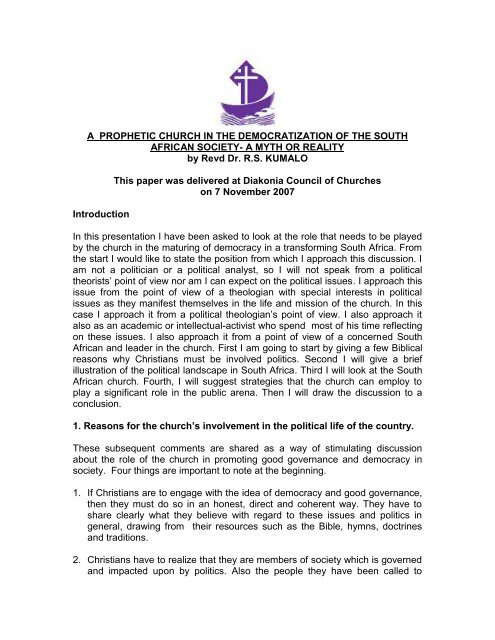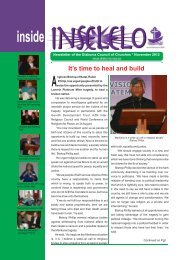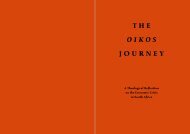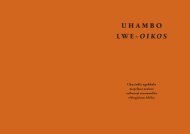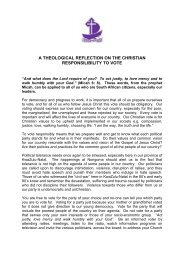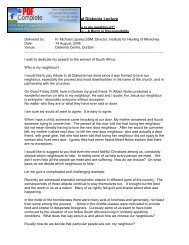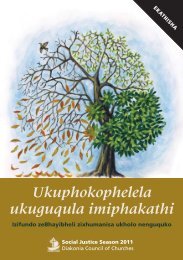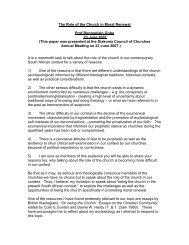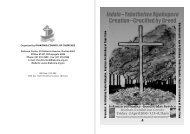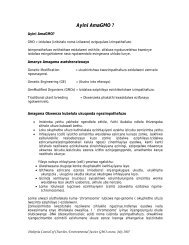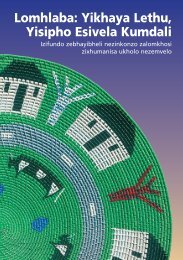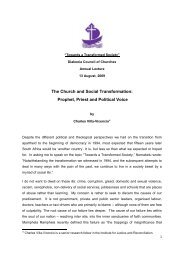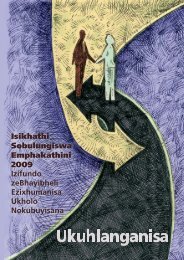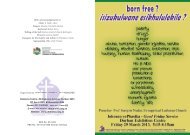a prophetic church in the democratization of the south african society
a prophetic church in the democratization of the south african society
a prophetic church in the democratization of the south african society
You also want an ePaper? Increase the reach of your titles
YUMPU automatically turns print PDFs into web optimized ePapers that Google loves.
A PROPHETIC CHURCH IN THE DEMOCRATIZATION OF THE SOUTH<br />
AFRICAN SOCIETY- A MYTH OR REALITY<br />
by Revd Dr. R.S. KUMALO<br />
Introduction<br />
This paper was delivered at Diakonia Council <strong>of</strong> Churches<br />
on 7 November 2007<br />
In this presentation I have been asked to look at <strong>the</strong> role that needs to be played<br />
by <strong>the</strong> <strong>church</strong> <strong>in</strong> <strong>the</strong> matur<strong>in</strong>g <strong>of</strong> democracy <strong>in</strong> a transform<strong>in</strong>g South Africa. From<br />
<strong>the</strong> start I would like to state <strong>the</strong> position from which I approach this discussion. I<br />
am not a politician or a political analyst, so I will not speak from a political<br />
<strong>the</strong>orists‟ po<strong>in</strong>t <strong>of</strong> view nor am I can expect on <strong>the</strong> political issues. I approach this<br />
issue from <strong>the</strong> po<strong>in</strong>t <strong>of</strong> view <strong>of</strong> a <strong>the</strong>ologian with special <strong>in</strong>terests <strong>in</strong> political<br />
issues as <strong>the</strong>y manifest <strong>the</strong>mselves <strong>in</strong> <strong>the</strong> life and mission <strong>of</strong> <strong>the</strong> <strong>church</strong>. In this<br />
case I approach it from a political <strong>the</strong>ologian‟s po<strong>in</strong>t <strong>of</strong> view. I also approach it<br />
also as an academic or <strong>in</strong>tellectual-activist who spend most <strong>of</strong> his time reflect<strong>in</strong>g<br />
on <strong>the</strong>se issues. I also approach it from a po<strong>in</strong>t <strong>of</strong> view <strong>of</strong> a concerned South<br />
African and leader <strong>in</strong> <strong>the</strong> <strong>church</strong>. First I am go<strong>in</strong>g to start by giv<strong>in</strong>g a few Biblical<br />
reasons why Christians must be <strong>in</strong>volved politics. Second I will give a brief<br />
illustration <strong>of</strong> <strong>the</strong> political landscape <strong>in</strong> South Africa. Third I will look at <strong>the</strong> South<br />
African <strong>church</strong>. Fourth, I will suggest strategies that <strong>the</strong> <strong>church</strong> can employ to<br />
play a significant role <strong>in</strong> <strong>the</strong> public arena. Then I will draw <strong>the</strong> discussion to a<br />
conclusion.<br />
1. Reasons for <strong>the</strong> <strong>church</strong>’s <strong>in</strong>volvement <strong>in</strong> <strong>the</strong> political life <strong>of</strong> <strong>the</strong> country.<br />
These subsequent comments are shared as a way <strong>of</strong> stimulat<strong>in</strong>g discussion<br />
about <strong>the</strong> role <strong>of</strong> <strong>the</strong> <strong>church</strong> <strong>in</strong> promot<strong>in</strong>g good governance and democracy <strong>in</strong><br />
<strong>society</strong>. Four th<strong>in</strong>gs are important to note at <strong>the</strong> beg<strong>in</strong>n<strong>in</strong>g.<br />
1. If Christians are to engage with <strong>the</strong> idea <strong>of</strong> democracy and good governance,<br />
<strong>the</strong>n <strong>the</strong>y must do so <strong>in</strong> an honest, direct and coherent way. They have to<br />
share clearly what <strong>the</strong>y believe with regard to <strong>the</strong>se issues and politics <strong>in</strong><br />
general, draw<strong>in</strong>g from <strong>the</strong>ir resources such as <strong>the</strong> Bible, hymns, doctr<strong>in</strong>es<br />
and traditions.<br />
2. Christians have to realize that <strong>the</strong>y are members <strong>of</strong> <strong>society</strong> which is governed<br />
and impacted upon by politics. Also <strong>the</strong> people <strong>the</strong>y have been called to
m<strong>in</strong>ister to are impacted upon by politics and issues <strong>of</strong> governance ei<strong>the</strong>r<br />
positively or negatively depend<strong>in</strong>g on who <strong>the</strong>y are and <strong>the</strong>ir social status.<br />
Therefore <strong>the</strong>y cannot ignore politics.<br />
3. It is important to note that <strong>the</strong> idea <strong>of</strong> democracy is not someth<strong>in</strong>g specifically<br />
religious or Christian. It has been found mostly <strong>in</strong> secular <strong>in</strong>stitutions ra<strong>the</strong>r<br />
than religious ones, because <strong>the</strong>se tend to be autocratic and <strong>the</strong>ocratic. But it<br />
is also important to understand that <strong>the</strong> struggle for democracy <strong>in</strong> <strong>society</strong> is a<br />
struggle aga<strong>in</strong>st any form <strong>of</strong> leadership that is undemocratic and viewed to be<br />
authoritarian.<br />
4. It is also important to recognize that Christianity like most religions has a<br />
particular view <strong>of</strong> how <strong>the</strong> world is to be governed. For <strong>in</strong>stance Christianity<br />
builds on <strong>the</strong> view that <strong>the</strong> world has to be governed us<strong>in</strong>g <strong>the</strong> basic<br />
pr<strong>in</strong>ciples‟ <strong>of</strong> governance <strong>in</strong> God‟s household such as equality, justice, peace<br />
and human dignity. I propose that it is imperative for <strong>the</strong> <strong>church</strong> to teach,<br />
practice and enact <strong>the</strong>se pr<strong>in</strong>ciples <strong>in</strong> <strong>the</strong> public arena as part <strong>of</strong> its mission.<br />
In spite <strong>of</strong> <strong>the</strong> above reasons that justify <strong>the</strong> <strong>in</strong>volvement <strong>of</strong> <strong>the</strong> <strong>church</strong> <strong>in</strong> matters<br />
<strong>of</strong> political nature and governance, <strong>the</strong>re has been a sense <strong>of</strong> disagreement and<br />
disappo<strong>in</strong>tment from some quarters <strong>in</strong> our <strong>society</strong> that s<strong>in</strong>ce <strong>the</strong> beg<strong>in</strong>n<strong>in</strong>g <strong>of</strong> <strong>the</strong><br />
new dispensation <strong>the</strong> <strong>church</strong> has not been <strong>in</strong>volved <strong>in</strong> <strong>the</strong> political life <strong>of</strong> <strong>the</strong><br />
country. Constantly we have heard questions such as, where is <strong>the</strong> <strong>prophetic</strong><br />
Church ? Where have all <strong>the</strong> prophets gone to? Most <strong>of</strong> <strong>the</strong> time such questions<br />
come from people ei<strong>the</strong>r who work with poor people who feel that <strong>the</strong> <strong>church</strong> has<br />
neglected <strong>the</strong>m. But it also comes from government <strong>of</strong>ficials when <strong>the</strong>y want <strong>the</strong><br />
<strong>church</strong> to help <strong>the</strong>m deal with problems such as <strong>the</strong> breakdown <strong>of</strong> <strong>the</strong> moral fiber<br />
or to deliver services. For bus<strong>in</strong>ess people when <strong>the</strong>y are frustrated by crime and<br />
corruption <strong>the</strong>y also ask <strong>the</strong> same questions. The above groups ask <strong>the</strong> question<br />
<strong>of</strong> <strong>the</strong> whereabouts <strong>of</strong> <strong>the</strong> <strong>church</strong> not because <strong>the</strong>y are look<strong>in</strong>g for a <strong>prophetic</strong><br />
<strong>church</strong>, but one that can cooperate with <strong>the</strong>m and most <strong>of</strong> <strong>the</strong> time <strong>in</strong> <strong>the</strong>ir own<br />
terms, not those <strong>of</strong> <strong>the</strong> <strong>church</strong>. The poor ask this question because <strong>the</strong>y are<br />
look<strong>in</strong>g for a different <strong>church</strong>, one that will walk with <strong>the</strong>m as <strong>the</strong>y are faced by<br />
<strong>the</strong> dehumanization that <strong>the</strong>y still experience even <strong>in</strong> <strong>the</strong> new dispensation<br />
through lack <strong>of</strong> basic human necessities such as water, hous<strong>in</strong>g, jobs and <strong>the</strong><br />
erosion <strong>of</strong> <strong>the</strong>ir dignity. As a result for most <strong>of</strong> <strong>the</strong>m to talk <strong>of</strong> a <strong>prophetic</strong> <strong>church</strong><br />
<strong>in</strong> South Africa is to talk <strong>of</strong> a dream not reality. But <strong>the</strong> question to ask is “Is a<br />
<strong>prophetic</strong> <strong>church</strong> <strong>in</strong> South Africa a myth or reality? Are <strong>the</strong> assumptions that <strong>the</strong><br />
<strong>church</strong> is not <strong>prophetic</strong> anymore true or misplaced? In o<strong>the</strong>r words is a <strong>prophetic</strong><br />
<strong>church</strong> <strong>in</strong> SA just a pipe-dream or a dream that is gradually becom<strong>in</strong>g a reality?<br />
Those are <strong>the</strong> questions I hope to address <strong>in</strong> this presentation. I th<strong>in</strong>k <strong>in</strong> a<br />
discussion <strong>of</strong> this nature it is imperative that we start with def<strong>in</strong><strong>in</strong>g what we mean<br />
by a <strong>prophetic</strong> <strong>church</strong>. By a <strong>prophetic</strong> <strong>church</strong> we mean “a <strong>church</strong> that engages<br />
itself <strong>in</strong> socio, economic and political life <strong>of</strong> a <strong>society</strong>, guided by its understand<strong>in</strong>g<br />
<strong>of</strong> <strong>the</strong> K<strong>in</strong>gdom <strong>of</strong> God, hold<strong>in</strong>g <strong>the</strong> transformation <strong>of</strong> <strong>the</strong> world to emulate values
<strong>of</strong> <strong>the</strong> k<strong>in</strong>gdom as its vision and mission to <strong>the</strong> world. By <strong>the</strong> <strong>church</strong> here I refer<br />
to both <strong>the</strong> <strong>church</strong> as a community <strong>of</strong> believers, <strong>the</strong> people <strong>of</strong> God at worship,<br />
fellowship and service <strong>in</strong> <strong>the</strong>ir local communities. Secondly I also mean <strong>the</strong><br />
<strong>in</strong>stitutional <strong>church</strong>, <strong>the</strong> <strong>church</strong> as a hierarchy, <strong>the</strong> representatives <strong>of</strong> <strong>the</strong> people<br />
<strong>of</strong> God such pastors and bishops toge<strong>the</strong>r with <strong>the</strong> structures <strong>of</strong> <strong>the</strong> <strong>church</strong>. So I<br />
will use <strong>the</strong> term” <strong>church</strong>” <strong>in</strong>terchangeably referr<strong>in</strong>g to <strong>the</strong>se two groups.<br />
2. Explor<strong>in</strong>g <strong>the</strong> political landscape <strong>of</strong> <strong>the</strong> South African <strong>society</strong><br />
Impacted <strong>of</strong> democracy to people <strong>in</strong> <strong>society</strong>.<br />
Social level<br />
It is a fact that <strong>the</strong> current dispensation brought a lot <strong>of</strong> benefits for people <strong>in</strong><br />
South Africa. As a we are always rem<strong>in</strong>ded, democracy brought freedom with it.<br />
Just <strong>the</strong> feel<strong>in</strong>g <strong>of</strong> be<strong>in</strong>g an important and respected citizens <strong>of</strong> a country without<br />
be<strong>in</strong>g restricted by laws on where to stay, buy, what to ride, swim, work is an<br />
achievement. The freedom to associate with any person or organization is an<br />
added value.<br />
Economic level<br />
The economy <strong>of</strong> this country is grow<strong>in</strong>g at a rate <strong>of</strong> about 6% annually which is<br />
quite an achievement. More people have houses, access to water and electricity,<br />
education and health care. It is also true that despite <strong>the</strong>se success stories South<br />
Africa is experienc<strong>in</strong>g a flurry <strong>of</strong> challenges that leave <strong>the</strong> majority <strong>of</strong> citizens<br />
without enjoy<strong>in</strong>g <strong>the</strong> benefits <strong>of</strong> freedom and democracy. More people are faced<br />
with problems such as abject poverty, unemployment, hous<strong>in</strong>g, land and lack <strong>of</strong><br />
service delivery etc. As a result we have seen a number <strong>of</strong> riots and resistance<br />
activities by dissatisfied communities Khutsong, Harrismith, Vryburg etc. This<br />
demonstrates that <strong>the</strong> growth <strong>of</strong> <strong>the</strong> economy does not translate to a better life<br />
for all people <strong>in</strong> <strong>the</strong> country. It is this group that feels alienated by <strong>the</strong> <strong>church</strong>.<br />
Political level<br />
At a political level <strong>the</strong> loom<strong>in</strong>g elections <strong>of</strong> <strong>the</strong> leader <strong>of</strong> <strong>the</strong> rul<strong>in</strong>g party <strong>in</strong><br />
Limpompo has led to a focus to <strong>the</strong> so called “succession debate.” The media<br />
has played a big role <strong>in</strong> creat<strong>in</strong>g a discussion around this issue and this has<br />
raised a number <strong>of</strong> po<strong>in</strong>ts <strong>of</strong> views, some positive and o<strong>the</strong>rs negative on how<br />
this issue is go<strong>in</strong>g to impact on <strong>the</strong> country. The <strong>church</strong> has been conspicuously<br />
silence when it comes to this issue. What need to be explored are <strong>the</strong> reasons<br />
for <strong>the</strong> silence and also strategies to address it and that is what I am turn<strong>in</strong>g to<br />
now.<br />
3. Strategies <strong>of</strong> build<strong>in</strong>g good governance through <strong>the</strong> Religion<br />
and Governance Programme.<br />
I will now identify strategies to address <strong>the</strong> lack <strong>of</strong> participation <strong>of</strong> <strong>the</strong> <strong>church</strong> <strong>in</strong><br />
public processes <strong>of</strong> governance. The question is, “what practical strategies can
<strong>the</strong> <strong>church</strong> apply to participate <strong>in</strong> <strong>the</strong> nurtur<strong>in</strong>g <strong>of</strong> good governance <strong>in</strong> South<br />
Africa?” How can <strong>the</strong> dream <strong>of</strong> a <strong>prophetic</strong> <strong>church</strong> become a reality?<br />
3.1 Discover<strong>in</strong>g a <strong>the</strong>ology <strong>of</strong> democracy<br />
Dur<strong>in</strong>g <strong>the</strong> struggle aga<strong>in</strong>st apar<strong>the</strong>id <strong>the</strong>re was an abundance <strong>of</strong> liberation<br />
<strong>the</strong>ologians that helped <strong>the</strong> <strong>church</strong> with <strong>the</strong>ological frameworks when do<strong>in</strong>g <strong>the</strong>ir<br />
socio-economic and political-analysis work. Dur<strong>in</strong>g <strong>the</strong> early years <strong>of</strong> transition<br />
<strong>the</strong> government had a negative attitude towards <strong>the</strong>ology see<strong>in</strong>g it as <strong>of</strong> no value<br />
<strong>in</strong> comparison to science and o<strong>the</strong>r discipl<strong>in</strong>es (SABC, 16 June 2000) necessary<br />
to <strong>the</strong> build<strong>in</strong>g <strong>of</strong> a new <strong>society</strong>. This led to a closure <strong>of</strong> <strong>the</strong>ological faculties and<br />
a mass departure <strong>of</strong> <strong>the</strong>ologians to o<strong>the</strong>r fields such as government and private<br />
sector. As result <strong>the</strong>re has been a vacuum <strong>in</strong> <strong>the</strong> <strong>the</strong>ological discourse.<br />
Archbishop Tutu has argued for a <strong>the</strong>ology that will propagate <strong>the</strong> <strong>church</strong>‟s<br />
<strong>in</strong>volvement <strong>in</strong> politics;<br />
If we say that religion cannot be concerned with politics, <strong>the</strong>n we are really<br />
say<strong>in</strong>g that <strong>the</strong>re is a substantial part <strong>of</strong> human life <strong>in</strong> which God‟s writ does not<br />
run. Religion is not a form <strong>of</strong> escapism. Our God does not permit us to dwell <strong>in</strong> a<br />
k<strong>in</strong>d <strong>of</strong> spiritual ghetto, <strong>in</strong>sulated from <strong>the</strong> real life out <strong>the</strong>re. Out God is not a God<br />
who sanctifies <strong>the</strong> status quo. He is a God <strong>of</strong> surprises, uproot<strong>in</strong>g <strong>the</strong> powerful<br />
and unjust to establish His K<strong>in</strong>gdom (<strong>in</strong> Sparks, 2006:295).<br />
These are s<strong>in</strong>ews <strong>of</strong> a <strong>the</strong>ology <strong>of</strong> democracy that must be developed by <strong>the</strong><br />
<strong>church</strong>, to guide its <strong>in</strong>volvement and upon which effective strategies <strong>of</strong><br />
engagement with <strong>the</strong> state must be built. The good news is that this <strong>the</strong>ology is<br />
already <strong>the</strong>re, some people especially <strong>the</strong> poor are practic<strong>in</strong>g it though <strong>in</strong> <strong>the</strong><br />
fr<strong>in</strong>ges <strong>of</strong> <strong>society</strong>, thus <strong>the</strong> <strong>church</strong> misses it. On <strong>the</strong> 23 rd October 2007 I attended<br />
a workshop organized by ESSET. What was unique was that by far <strong>the</strong> majority<br />
<strong>of</strong> participants close to 94% were people represent<strong>in</strong>g <strong>the</strong> poor e.g. homeless,<br />
PLWA, LPM and Anti-privatization Campaign. There were not more than five<br />
<strong>church</strong> leaders at that meet<strong>in</strong>g. There was a po<strong>in</strong>t where a young women activist<br />
from Soweto who is a devout Christian spoke about <strong>the</strong> <strong>the</strong>ology <strong>of</strong> water, water<br />
as life, a gif from God for all, people as need<strong>in</strong>g to dr<strong>in</strong>k from <strong>the</strong> same well <strong>of</strong><br />
Jacob, no matter who <strong>the</strong>y are and where <strong>the</strong>y stay. The <strong>the</strong>ological s<strong>in</strong>ews and<br />
<strong>in</strong>sights she raised can make some <strong>of</strong> us pr<strong>of</strong>essional <strong>the</strong>ologians feel like<br />
Sunday school children. The po<strong>in</strong>t I am mak<strong>in</strong>g is that <strong>the</strong>re is a <strong>the</strong>ology <strong>of</strong><br />
democracy out <strong>the</strong>re; as Graham Philpott put it “<strong>the</strong> <strong>church</strong> has to listen from <strong>the</strong><br />
poor as <strong>the</strong>y articulate <strong>the</strong> <strong>the</strong>ology that emanates from <strong>the</strong>ir experiences.” 1 For<br />
me <strong>the</strong> <strong>prophetic</strong> <strong>church</strong> is already busy work<strong>in</strong>g <strong>in</strong> communities through such<br />
people and FBOs it is only that <strong>the</strong> <strong>in</strong>stitutional <strong>church</strong> has not realized it, thus it<br />
sleeps on. Hav<strong>in</strong>g formulated a <strong>the</strong>ology <strong>of</strong> democracy <strong>the</strong> <strong>church</strong> will <strong>the</strong>n<br />
embark on appropriate strategies <strong>of</strong> engag<strong>in</strong>g government us<strong>in</strong>g exist<strong>in</strong>g spaces<br />
and <strong>in</strong>vent some where necessary.<br />
3.2. Explor<strong>in</strong>g <strong>the</strong> notion <strong>of</strong> critical solidarity<br />
1 Graham Philpott was evaluat<strong>in</strong>g <strong>the</strong> conference, 23 October 2007, ESSET Meet<strong>in</strong>g Johannesburg.
There was a shift <strong>in</strong> <strong>the</strong> way <strong>the</strong> <strong>church</strong> related from <strong>the</strong> apar<strong>the</strong>id government to<br />
<strong>the</strong> democratic one. The key term that def<strong>in</strong>es <strong>church</strong>-state relations <strong>in</strong><br />
contemporary South Africa is critical solidarity, which means that <strong>the</strong> <strong>church</strong><br />
supports <strong>in</strong>itiatives which promotes justice, peace, democracy, protect<strong>in</strong>g <strong>the</strong><br />
<strong>in</strong>terest <strong>of</strong> those vulnerable and m<strong>in</strong>ority groups while cont<strong>in</strong>u<strong>in</strong>g to protest<br />
aga<strong>in</strong>st unjust policies that <strong>the</strong> democratic government put <strong>in</strong> place. This means<br />
that a new approach to <strong>church</strong>-state relations needs to be developed which<br />
moves away from <strong>the</strong> dom<strong>in</strong>ant models <strong>in</strong> which <strong>the</strong> <strong>church</strong> is ei<strong>the</strong>r absorbed by<br />
<strong>the</strong> state or it regards <strong>the</strong> state as an enemy. But one where <strong>the</strong> <strong>church</strong><br />
ma<strong>in</strong>ta<strong>in</strong>s an <strong>in</strong>dependent and critical stance from which it can engage<br />
government ei<strong>the</strong>r with affirmations or criticism depend<strong>in</strong>g on <strong>the</strong> circumstances.<br />
This proposes a new approach from <strong>the</strong> old ones where <strong>the</strong> <strong>church</strong> was ei<strong>the</strong>r a<br />
puppet <strong>of</strong> <strong>the</strong> state or an enemy. T<strong>in</strong>yiko Maluleke puts it this way:<br />
We must move away from <strong>the</strong> two extreme models <strong>of</strong> <strong>church</strong>-state <strong>in</strong>teraction:<br />
lapdog or cat and mouse (Ecumenical Consultation Report, 23-26 March 2003).<br />
Echo<strong>in</strong>g <strong>the</strong> sentiments for a new way for <strong>church</strong> and state relations <strong>in</strong> South<br />
Africa, <strong>the</strong> Rev. Roxanne Jordan a proponent <strong>of</strong> liberation <strong>the</strong>ology who later<br />
became <strong>the</strong> speaker <strong>of</strong> <strong>the</strong> Nelson Mandela Metropolitan Council argued:<br />
The role <strong>of</strong> <strong>the</strong> <strong>church</strong> <strong>in</strong> <strong>the</strong> new South Africa is constructive engagement and critical<br />
solidarity (Interview, 18 July 2001).<br />
The notion <strong>of</strong> „critical solidarity‟ is built on <strong>the</strong> foundations <strong>of</strong> liberation <strong>the</strong>ology<br />
and <strong>the</strong>ologies <strong>of</strong> reconstruction, which cont<strong>in</strong>ues <strong>the</strong> tradition <strong>of</strong> God‟s<br />
preferential option for <strong>the</strong> poor. It also calls for obey<strong>in</strong>g <strong>the</strong> laws <strong>of</strong> <strong>the</strong> country<br />
only if <strong>the</strong>y are not contrary to <strong>the</strong> laws <strong>of</strong> God, (Acts 4:19, 5:29). The <strong>church</strong>es<br />
also base <strong>the</strong>ir participation on <strong>the</strong> text that says, “The earth is <strong>of</strong> <strong>the</strong> Lord and all<br />
that is <strong>in</strong> it”, (Psalm 24:1) thus br<strong>in</strong>g<strong>in</strong>g congruence between ecclesial and<br />
societal issues. This <strong>in</strong>cludes an embrace <strong>of</strong> <strong>the</strong> liberal constitution that declared<br />
<strong>the</strong> country a neutral-religious state. Be<strong>in</strong>g a neutral-religious state means that<br />
“South Africans are protected from both <strong>the</strong>ocracy and a<strong>the</strong>ism, meanwhile<br />
allow<strong>in</strong>g religion to exist without any constitutional impediments” (Villa-Vicencio,<br />
1992:264). A <strong>prophetic</strong> role <strong>in</strong> this situation means that <strong>the</strong> <strong>church</strong> affirms<br />
government when it is address<strong>in</strong>g <strong>the</strong> needs <strong>of</strong> all people especially <strong>the</strong> poor, but<br />
also criticizes and distances itself from it when it is ignor<strong>in</strong>g <strong>the</strong>m. In this case <strong>the</strong><br />
<strong>church</strong> never stands with government but with <strong>the</strong> poor, it is government who<br />
jo<strong>in</strong>s <strong>the</strong> <strong>church</strong> and <strong>the</strong> poor and it benefit from <strong>the</strong> affirmation and praises <strong>of</strong><br />
<strong>the</strong> <strong>church</strong>, but as soon as it leaves <strong>the</strong> poor, it has left <strong>the</strong> <strong>church</strong> and risks <strong>the</strong><br />
ruthless criticism and denunciation <strong>of</strong> <strong>the</strong> <strong>church</strong> <strong>in</strong> <strong>the</strong> name <strong>of</strong> God.<br />
3.3. Offer<strong>in</strong>g Christian-centered civic Christian Education<br />
One <strong>of</strong> <strong>the</strong> pa<strong>in</strong>ful facts about politics is that people get <strong>the</strong> leaders <strong>the</strong>y deserve.<br />
If people are enlightened and know what <strong>the</strong>y are look<strong>in</strong>g for <strong>in</strong> a leader <strong>of</strong> <strong>the</strong>ir<br />
country, <strong>the</strong>y choose a leader who fits <strong>the</strong>ir expectations with traits such as good<br />
governance abilities, high moral conduct, leadership qualities etc. But if people
do not know what type <strong>of</strong> leader <strong>the</strong>ir <strong>society</strong> needs <strong>the</strong>y elect us<strong>in</strong>g all <strong>the</strong> wrong<br />
criterias such as ethnicity, charisma, popularity etc. In SA we are faced with that<br />
time <strong>of</strong> mak<strong>in</strong>g choices and people are not yet prepared for that. They know voter<br />
education but <strong>the</strong>y have no clue <strong>of</strong> civic education which <strong>in</strong>cludes know<strong>in</strong>g <strong>the</strong><br />
system <strong>of</strong> governance, how it functions, and what type <strong>of</strong> leaders are appropriate<br />
to it. People can hardly tell you what type <strong>of</strong> leader is needed by this country,<br />
<strong>the</strong>y would ra<strong>the</strong>r tell you about which party must <strong>the</strong> person come from. I th<strong>in</strong>k it<br />
is time that <strong>the</strong> <strong>church</strong> embarked on an <strong>in</strong>tentional Civic-based Christian<br />
Education which will teach people about <strong>the</strong>ir rights as citizens and how<br />
important <strong>the</strong>se are for democracy. This will <strong>in</strong>clude teach<strong>in</strong>g people about <strong>the</strong><br />
three levels <strong>of</strong> government, <strong>the</strong> processes <strong>of</strong> elect<strong>in</strong>g <strong>of</strong>ficials start<strong>in</strong>g from <strong>the</strong><br />
local municipality level right up to Parliament. Those who are runn<strong>in</strong>g for high<br />
<strong>of</strong>fice must be challenged to produce <strong>the</strong>ir manifestos, so that <strong>the</strong>se may be<br />
taught to <strong>the</strong> people, who ultimately will make <strong>the</strong> choice <strong>of</strong> <strong>the</strong> leader, based on<br />
what <strong>the</strong>y stand for and promises to do <strong>in</strong>stead <strong>of</strong> <strong>the</strong>ir political slogans and<br />
rhetoric that is only heard through <strong>the</strong> media and rallies. I do th<strong>in</strong>k that <strong>the</strong> <strong>church</strong><br />
can play an important role to make people to decide responsibly who to vote for<br />
and why through education. I contend that it is <strong>the</strong> mission <strong>of</strong> <strong>the</strong> <strong>church</strong> to<br />
provide knowledge, so that know<strong>in</strong>g people may live well (Hosea 4:6).<br />
3.3. Clean<strong>in</strong>g our own house: Inculcat<strong>in</strong>g democracy <strong>in</strong> <strong>the</strong> <strong>church</strong><br />
Be<strong>in</strong>g a <strong>prophetic</strong> <strong>church</strong> does not necessarily mean be<strong>in</strong>g critical <strong>of</strong> o<strong>the</strong>rs only<br />
but it also means that <strong>the</strong> <strong>church</strong> needs to be critical <strong>of</strong> itself. It has to allow<br />
God‟s spirit and messengers to speak truth not only to secular powers but also to<br />
<strong>the</strong> powers <strong>in</strong> and with<strong>in</strong> <strong>the</strong> <strong>church</strong> itself. If <strong>the</strong> <strong>church</strong> is go<strong>in</strong>g to call for<br />
democracy and good governance <strong>in</strong> <strong>society</strong> with credibility, <strong>the</strong>n it faces <strong>the</strong><br />
challenge <strong>of</strong> implement<strong>in</strong>g democracy with<strong>in</strong> its own structures. For an example,<br />
regard<strong>in</strong>g gender and democracy, our analysis is that many <strong>church</strong>es and faith<br />
communities lag beh<strong>in</strong>d <strong>society</strong> <strong>in</strong> general <strong>in</strong> address<strong>in</strong>g patriarchal traditions<br />
and <strong>the</strong> transformation <strong>of</strong> <strong>the</strong>ir own undemocratic structures, policies, and<br />
practices. Women and youth are under-represented <strong>in</strong> positions <strong>of</strong> leadership <strong>in</strong><br />
<strong>the</strong> <strong>church</strong>‟s governance structures. For <strong>the</strong> <strong>church</strong>es to act <strong>prophetic</strong>ally (and<br />
add value <strong>in</strong> a democracy) <strong>the</strong>y need to take democracy with<strong>in</strong> <strong>the</strong> <strong>church</strong>es<br />
<strong>the</strong>mselves seriously. It is hypocritical to expect to challenge a president who<br />
wants to change a constitution to run for more terms <strong>in</strong> <strong>of</strong>fice, whilst bishops <strong>in</strong><br />
<strong>the</strong> <strong>church</strong> are resist<strong>in</strong>g <strong>the</strong> change <strong>of</strong> <strong>the</strong> term <strong>of</strong> <strong>of</strong>fice from life to a number <strong>of</strong><br />
years as permitted by periodical elections and evaluation. Be<strong>in</strong>g a <strong>prophetic</strong><br />
<strong>church</strong> would mean that <strong>the</strong> <strong>church</strong> listens to those <strong>prophetic</strong> voices with<strong>in</strong> <strong>the</strong><br />
<strong>church</strong> itself, challenge its own ethos and rules.<br />
3.4. Us<strong>in</strong>g <strong>the</strong> <strong>in</strong>vited spaces effectively to <strong>in</strong>fluence a parliamentary<br />
democracy<br />
One <strong>of</strong> <strong>the</strong> key criticisms leveled aga<strong>in</strong>st <strong>the</strong> South African government has been<br />
<strong>the</strong> centralization <strong>of</strong> power around <strong>the</strong> presidency. There is a feel<strong>in</strong>g that<br />
government is tightly controlled by <strong>the</strong> president‟s <strong>of</strong>fice so that it is difficult for<br />
o<strong>the</strong>r groups, whe<strong>the</strong>r civil <strong>society</strong>, opposition parties and faith communities (<strong>the</strong>
<strong>church</strong> <strong>in</strong>cluded), to engage it or participate <strong>in</strong> it. The first person to raise <strong>the</strong>se<br />
concerns was Archbishop Tutu when he delivered <strong>the</strong> Nelson Mandela lecture <strong>in</strong><br />
2005 at University <strong>of</strong> <strong>the</strong> Witwatersrand <strong>in</strong> Johannesburg. The second<br />
observations about <strong>the</strong> lack <strong>of</strong> a robust democracy as a result <strong>of</strong> too much<br />
centralization <strong>of</strong> power came from one <strong>of</strong> <strong>the</strong> key members <strong>of</strong> <strong>the</strong> Tripartite<br />
Alliance (which <strong>in</strong>cludes <strong>the</strong> rul<strong>in</strong>g party), <strong>the</strong> South African Communist Party<br />
(SACP) who argued:<br />
It (<strong>the</strong> presidential centre) has sought to build a strong centre with<strong>in</strong> <strong>the</strong> state, <strong>in</strong><br />
which <strong>the</strong> lead<strong>in</strong>g cadre is made up <strong>of</strong> a new political elite (state managers and<br />
technocratic ally-<strong>in</strong>cl<strong>in</strong>ed m<strong>in</strong>isters) and (<strong>of</strong>ten overlapp<strong>in</strong>g with <strong>the</strong>m) a new<br />
generation <strong>of</strong> black private sector BEE managers/capitalists (Bua Komanisi,<br />
1May 2006). 2<br />
The centralization <strong>of</strong> power and tight control <strong>of</strong> democratic processes was aga<strong>in</strong>st one <strong>of</strong> <strong>the</strong> key<br />
pr<strong>in</strong>ciples <strong>of</strong> <strong>the</strong> Freedom Charter (manifesto <strong>of</strong> <strong>the</strong> ANC) that said “The People Shall Govern”<br />
(Polley, 1988:25). The question that needs to be asked today is, are <strong>the</strong> people really govern<strong>in</strong>g?<br />
Political <strong>the</strong>orist Xolelwa Mangcu argues that “<strong>the</strong> people are not govern<strong>in</strong>g but <strong>in</strong>stead <strong>the</strong>y just<br />
follow <strong>the</strong> elected leaders.” He argues, “Many <strong>of</strong> <strong>the</strong> former activists <strong>in</strong> South Africa have found<br />
that <strong>the</strong>y have to go along” (Calland & Graham, 2005:72). When listen<strong>in</strong>g to <strong>the</strong> majority <strong>of</strong> South<br />
Africans <strong>the</strong>y hoped for a decentralized government built on <strong>the</strong> basic foundations <strong>of</strong> direct<br />
democracy. However, that is not what <strong>the</strong>y are experienc<strong>in</strong>g. The same observations are<br />
made by Richard van der Ross <strong>in</strong> his book African Renaissance and Democracy.<br />
Where he asserts that:<br />
Even today, most South Africans, <strong>of</strong> whatever color, do not consider that <strong>the</strong>y<br />
can do much, if anyth<strong>in</strong>g, about <strong>in</strong>fluenc<strong>in</strong>g <strong>the</strong> law, let alone change it. They go<br />
to <strong>the</strong> polls once <strong>in</strong> five years, cast <strong>the</strong>ir vote for a party, and leave <strong>the</strong> rest to <strong>the</strong><br />
politicians. If th<strong>in</strong>gs go wrong, this is blamed on government, but <strong>the</strong>y, <strong>the</strong><br />
citizens, feel <strong>the</strong>y can do noth<strong>in</strong>g about it until <strong>the</strong> next election, especially as,<br />
under <strong>the</strong> system <strong>of</strong> Proportional Representation, <strong>the</strong>y have no immediate<br />
contact with or recourse to a Member <strong>of</strong> Parliament to act as local sound<strong>in</strong>gboard<br />
for <strong>the</strong>ir compla<strong>in</strong>ts or op<strong>in</strong>ion (2004:24).<br />
As a result democracy <strong>in</strong> South Africa has been labeled as a „Parliamentary<br />
Democracy‟ where elected representatives run <strong>the</strong> government on behalf <strong>of</strong> <strong>the</strong><br />
masses (Bua Komanisi, 24 May 2006). Citizens wait for delivery <strong>of</strong> services as<br />
promised and so <strong>the</strong> government is seen as a delivery-mechanism not a system<br />
<strong>of</strong> participation <strong>in</strong> <strong>the</strong> governance <strong>of</strong> <strong>the</strong> country. Civil <strong>society</strong> groups are f<strong>in</strong>d<strong>in</strong>g it<br />
very difficult to <strong>in</strong>fluence government as required by democracy which is <strong>the</strong><br />
government <strong>of</strong> <strong>the</strong> people. In <strong>the</strong> words <strong>of</strong> Peter Vale it is no longer a “liv<strong>in</strong>g<br />
democracy” (Calland & Graham 2005:13). K Fayemi po<strong>in</strong>ts to <strong>the</strong> problem with<br />
this when he notes; “when we <strong>the</strong> people withdraw our trust <strong>in</strong> leaders or<br />
discountenance politicians, we make our democratic <strong>in</strong>stitutions less effective<br />
and risk mak<strong>in</strong>g ourselves ungovernable”. Fayemi goes on to argue that;<br />
2 BEE refers to Black Economic Empowerment, a strategy aimed at balanc<strong>in</strong>g <strong>the</strong> economic <strong>in</strong>equalities by<br />
<strong>of</strong>fer<strong>in</strong>g black people opportunities to own bus<strong>in</strong>esses.
Real leadership ought to <strong>in</strong>volve motivat<strong>in</strong>g people to solve problems with<strong>in</strong> <strong>the</strong>ir<br />
own communities, ra<strong>the</strong>r than re<strong>in</strong>forc<strong>in</strong>g <strong>the</strong> overlords <strong>of</strong> <strong>the</strong> state over its<br />
citizens, and to build and streng<strong>the</strong>n political <strong>in</strong>stitutions that can mediate<br />
between <strong>in</strong>dividual and group <strong>in</strong>terests (2006:56).<br />
The challenge is that even those who were elected by <strong>the</strong> people to be <strong>the</strong>ir<br />
leaders are not always held accountable by <strong>the</strong> people who elected <strong>the</strong>m. This is<br />
because <strong>the</strong> floor cross<strong>in</strong>g law allow MPs to change from one party to ano<strong>the</strong>r,<br />
without <strong>the</strong> permission <strong>of</strong> <strong>the</strong>ir constituencies. This also lead to political apathy<br />
because if people can just change parties without talk<strong>in</strong>g to me as <strong>the</strong> one who<br />
voted <strong>the</strong>m <strong>in</strong> <strong>the</strong> first place why do I need to take vot<strong>in</strong>g seriously. The above<br />
reason may be true for most sectors <strong>of</strong> <strong>society</strong> not to have a way <strong>of</strong> <strong>in</strong>fluenc<strong>in</strong>g<br />
government, but I am not sure if that is <strong>the</strong> case with <strong>the</strong> <strong>church</strong>. As we were told<br />
by Dr Frank Chikane <strong>in</strong> this same hall a month ago, <strong>the</strong> President has stand<strong>in</strong>g<br />
appo<strong>in</strong>tments to meet with religious leaders twice a year and more if <strong>the</strong>y wanted<br />
to, is that not an <strong>in</strong>vited space for <strong>the</strong> <strong>church</strong> to use? Where is <strong>the</strong> loophole?<br />
Secondly if you go to most <strong>of</strong> <strong>the</strong> prov<strong>in</strong>ces especially here <strong>in</strong> KZN <strong>the</strong>re is a<br />
will<strong>in</strong>gness from <strong>the</strong> part <strong>of</strong> government to collaborate with religious groups (<strong>the</strong><br />
<strong>church</strong> <strong>in</strong>cluded), <strong>of</strong> course <strong>the</strong>y want to do this <strong>in</strong> <strong>the</strong>ir own term and for <strong>the</strong>ir<br />
own agendas, but can we not use <strong>the</strong>se as opportunities to use <strong>in</strong> our own terms<br />
too as a <strong>church</strong> so that we become a <strong>prophetic</strong> <strong>church</strong>? I th<strong>in</strong>k <strong>the</strong> <strong>church</strong> can<br />
use <strong>the</strong> will<strong>in</strong>gness and few opportunities given to it by government to turn this<br />
democracy from a parliamentary one to a lived one, where <strong>the</strong> people can<br />
govern.<br />
3.5. Revitaliz<strong>in</strong>g socio-ecclesial analysis.<br />
Churches have relative autonomy from <strong>the</strong> state as well as <strong>the</strong> state towards <strong>the</strong><br />
<strong>church</strong>. To move towards work<strong>in</strong>g toge<strong>the</strong>r, or challeng<strong>in</strong>g one ano<strong>the</strong>r, requires<br />
a rigorous process <strong>of</strong> analysis so that <strong>the</strong> reasons, issues and terms <strong>of</strong><br />
cooperation, or resistance can be seen clearly. This requires <strong>the</strong> <strong>church</strong> to do<br />
socio-ecclesial analysis. Analysis enables <strong>the</strong> <strong>church</strong> to see <strong>the</strong> issues that need<br />
to be contested or affirmed much more clearly from an <strong>in</strong>formed position. This<br />
was confirmed by Itumeleng Mosala when speak<strong>in</strong>g <strong>in</strong> <strong>the</strong> RGP convention <strong>in</strong><br />
2005 he said” no analysis, no voice” (Report <strong>of</strong> Convention, 2005: 12). This<br />
means that <strong>the</strong> ability <strong>of</strong> <strong>the</strong> <strong>church</strong> to engage government lies <strong>in</strong> <strong>the</strong> amount <strong>of</strong><br />
work it is go<strong>in</strong>g to do <strong>in</strong> socio-ecclesial analysis and research. When Frank<br />
Chikane spoke to us he emphasized <strong>the</strong> importance <strong>of</strong> research so that <strong>the</strong><br />
<strong>church</strong> can talk from an <strong>in</strong>formed po<strong>in</strong>t <strong>of</strong> view <strong>in</strong>stead <strong>of</strong> mak<strong>in</strong>g naïve<br />
statement, thus embarrass<strong>in</strong>g itself to its adversaries such as politicians and<br />
bus<strong>in</strong>ess people. For <strong>in</strong>stance with regard to <strong>the</strong> succession debate <strong>the</strong> <strong>church</strong><br />
has been silent, it has not given any leadership direction to <strong>the</strong> masses<br />
especially its own members on what to do th<strong>in</strong>k and say about this issue.<br />
Christians have been left to <strong>the</strong>ir peril and only dependent to <strong>the</strong> views <strong>of</strong> <strong>the</strong><br />
contest<strong>in</strong>g forces such as partners <strong>of</strong> <strong>the</strong> alliances who are divided and o<strong>the</strong>r<br />
political parties who may be enjoy<strong>in</strong>g <strong>the</strong> divisions <strong>in</strong> <strong>the</strong> rul<strong>in</strong>g party. The <strong>church</strong><br />
does need to do clear analysis <strong>of</strong> <strong>the</strong> situation and <strong>the</strong>n guide <strong>the</strong> nation,<br />
because this is not just a political issue party concern<strong>in</strong>g who <strong>the</strong>y are to elect as
<strong>the</strong>ir president. This issue has to deal with vital matters <strong>of</strong> national <strong>in</strong>terest, here<br />
we are talk<strong>in</strong>g about a party that is rul<strong>in</strong>g <strong>the</strong> country and is likely to rule for more<br />
years to come, <strong>in</strong>stability <strong>in</strong> that party threatens <strong>the</strong> stability <strong>of</strong> <strong>the</strong> country. A<br />
<strong>prophetic</strong> <strong>church</strong> needs to come forward and call <strong>the</strong> both <strong>the</strong> party to sanity<br />
aga<strong>in</strong>. It must rem<strong>in</strong>d us that <strong>the</strong> issue round who will be <strong>the</strong> next president is not<br />
just a party political issue or one that has to do with personalities. It has to do<br />
with <strong>the</strong> foundations and future <strong>of</strong> <strong>the</strong> country, someth<strong>in</strong>g we al have approach<br />
with <strong>the</strong> required seriousness, humility and <strong>in</strong>tegrity. How <strong>the</strong> <strong>church</strong> will have <strong>the</strong><br />
courage to do this only if it takes time to study and analyze what is go<strong>in</strong>g on.<br />
Thus social analysis is key to giv<strong>in</strong>g a credible voice to <strong>the</strong> <strong>church</strong>.<br />
3.6. Strategic networks and partnership<br />
The effectiveness <strong>of</strong> <strong>the</strong> <strong>church</strong> <strong>in</strong> fight<strong>in</strong>g apar<strong>the</strong>id was through its partnership<br />
with o<strong>the</strong>r movements such as <strong>the</strong> United Democratic Front (UDF) and <strong>the</strong>, Black<br />
Consciousness Movement (BCM). This <strong>in</strong>dicates that <strong>the</strong> idea <strong>of</strong> partner<strong>in</strong>g and<br />
collaborat<strong>in</strong>g with o<strong>the</strong>r organizations committed to a common course can enable<br />
<strong>the</strong> <strong>church</strong> to make contribute effectively <strong>in</strong> <strong>the</strong> public arena. Currently <strong>in</strong> KZN,<br />
<strong>the</strong> KwaZulu Natal Christian Council has partnered with five Faith-based<br />
organization to form <strong>the</strong> KwaZulu Natal Christian Consortium. This strategic<br />
partnership among members constitut<strong>in</strong>g <strong>the</strong> consortium seek to ensure that <strong>the</strong><br />
quality and quantity <strong>of</strong> civil <strong>society</strong> engagement with public duty bearers is<br />
<strong>in</strong>creased and, <strong>the</strong>reby, contributed to a streng<strong>the</strong>ned social contract between<br />
<strong>the</strong> state and citizens <strong>in</strong> Kwa-Zulu Natal. It also provides a framework for<br />
multifaceted <strong>in</strong>stitutional cooperation as well as channels for mak<strong>in</strong>g l<strong>in</strong>kages<br />
from <strong>the</strong> poorest citizens at community level to decision makers <strong>in</strong> local<br />
communities, prov<strong>in</strong>cial and national <strong>in</strong>stitutions. Among <strong>the</strong> critical questions<br />
<strong>in</strong>clude questions <strong>of</strong> how do <strong>church</strong>es and <strong>church</strong>-based organizations (CBOs),<br />
and non-governmental organizations (NGOs) relate to one ano<strong>the</strong>r so that <strong>the</strong>y<br />
can engage government structures at local, prov<strong>in</strong>cial and national levels? At <strong>the</strong><br />
ESSET meet<strong>in</strong>g <strong>the</strong>re was a passionate call by delegates for <strong>the</strong>ir <strong>church</strong>es to<br />
jo<strong>in</strong> <strong>the</strong>m <strong>in</strong> <strong>the</strong>ir struggles. I must admit that by nature I am an eternal optimist, I<br />
believe <strong>in</strong> <strong>the</strong> redemptiveness <strong>of</strong> unpredictability. I am already see<strong>in</strong>g an active<br />
<strong>prophetic</strong> <strong>church</strong> <strong>in</strong> this country by just look<strong>in</strong>g at <strong>the</strong> recent events. For <strong>in</strong>stance<br />
<strong>the</strong>re was a time when religious leaders <strong>of</strong> Khutsong stood up with <strong>the</strong>ir people,<br />
marched and led <strong>the</strong>m <strong>in</strong> prayers <strong>of</strong> support. Just recently here <strong>in</strong> KZN some <strong>of</strong><br />
our leaders marched with <strong>the</strong> Abahlali basemijondolo and were sprayed with<br />
water with <strong>the</strong>m here <strong>in</strong> Durban. This for me is a sign <strong>of</strong> <strong>the</strong> com<strong>in</strong>g back <strong>of</strong> <strong>the</strong><br />
<strong>prophetic</strong> <strong>church</strong>.<br />
3.7. Ecumenical and multi-faith mobilizations<br />
One <strong>of</strong> <strong>the</strong> strengths <strong>of</strong> <strong>the</strong> <strong>church</strong> under apar<strong>the</strong>id is that it was backed by<br />
strong ecumenical constituencies and agencies thus it could maximize its impact<br />
<strong>in</strong> <strong>society</strong>. The challenge faced by <strong>the</strong> contemporary <strong>church</strong> is <strong>the</strong> loss <strong>of</strong> <strong>the</strong><br />
spirit <strong>of</strong> ecumenism. There are two reasons for this. One is that <strong>church</strong>es are<br />
tra<strong>in</strong><strong>in</strong>g <strong>the</strong>ir leaders denom<strong>in</strong>ationally, thus <strong>church</strong> leaders no longer value <strong>the</strong><br />
ecumenical colleagueship which those who went before experienced dur<strong>in</strong>g <strong>the</strong>ir
tra<strong>in</strong><strong>in</strong>g at places such as Rhodes and FEDSEM. The second reason l<strong>in</strong>ked to<br />
<strong>the</strong> first one is <strong>the</strong> lack <strong>of</strong> fund<strong>in</strong>g for ecumenical work from overseas agencies<br />
that valued <strong>the</strong> contribution <strong>of</strong> a united <strong>church</strong> front <strong>in</strong> South Africa. For <strong>in</strong>stance<br />
one <strong>of</strong> <strong>the</strong> biggest and consistent funders <strong>of</strong> ecumenical work <strong>in</strong> SA has been <strong>the</strong><br />
Norwegian Church Aid (NCA), which is now round<strong>in</strong>g up its work and wants to<br />
focus <strong>in</strong> o<strong>the</strong>r countries <strong>in</strong> <strong>the</strong> region. There is a need to f<strong>in</strong>d a way <strong>of</strong> reviv<strong>in</strong>g<br />
our ecumenical work and our <strong>church</strong>es need to commit to fund<strong>in</strong>g our<br />
ecumenical agencies. I am <strong>in</strong> <strong>the</strong> executive committee <strong>of</strong> one <strong>of</strong> our ecumenical<br />
bodies which is do<strong>in</strong>g important work <strong>in</strong> <strong>the</strong> prov<strong>in</strong>ce. When you look at <strong>the</strong><br />
contribution <strong>of</strong> member <strong>church</strong>es collectively it cannot even run that organization<br />
for one month. The organization depends on fundrais<strong>in</strong>g for survival as fund<strong>in</strong>g<br />
agencies reduce <strong>the</strong>ir commitments to such organizations this threatens <strong>the</strong>ir<br />
future and ultimately <strong>the</strong> future <strong>of</strong> a <strong>prophetic</strong> <strong>church</strong> <strong>in</strong> South Africa, because<br />
<strong>the</strong>n <strong>the</strong> <strong>church</strong> will need to depend on government‟s mercy and contracts which<br />
do not come without some str<strong>in</strong>gs attached. The po<strong>in</strong>t I am mak<strong>in</strong>g is that <strong>the</strong>re is<br />
an urgent need to streng<strong>the</strong>n<strong>in</strong>g <strong>the</strong> ecumenical movement both by mobiliz<strong>in</strong>g<br />
<strong>the</strong> masses to value ecumenism and resources to fund its work. This will enable<br />
<strong>the</strong> <strong>church</strong> to build for itself a position <strong>of</strong> power from which it can engage<br />
government and be an effective <strong>prophetic</strong> voice that is worth listen<strong>in</strong>g to because<br />
if not listened to it can act aga<strong>in</strong>st <strong>the</strong> state with great impact. Power is seductive<br />
and leads to corruption, but powerlessness is also bad. Therefore <strong>the</strong> <strong>church</strong><br />
must mobilize its resources to move from a state <strong>of</strong> powerlessness to that <strong>of</strong><br />
power. Government‟s power depends on money, but <strong>the</strong> <strong>church</strong> has <strong>the</strong> people,<br />
<strong>the</strong> numbers from which it derives effective power, but <strong>the</strong>se need to be<br />
harnessed. A <strong>prophetic</strong> <strong>church</strong> needs <strong>the</strong> masses, to be powerful and be a force<br />
to be reckoned with.<br />
3.8. Religious Forums<br />
Be<strong>in</strong>g <strong>in</strong> a neutral-religious state <strong>the</strong> <strong>church</strong> needs to learn to value <strong>the</strong><br />
relationship and collaboration with o<strong>the</strong>r religions. By constitution <strong>the</strong> government<br />
needs to work more with religious groups than denom<strong>in</strong>ations or sects. In his<br />
state <strong>of</strong> <strong>the</strong> prov<strong>in</strong>ce address early this year (2007) <strong>the</strong> Premier <strong>of</strong> KZN<br />
committed his government to work<strong>in</strong>g to develop Religious Forums and work with<br />
<strong>the</strong>m. It is a fact that is not for government to such forums that is dangerous but<br />
government does need such sectors to work with and make democracy a reality<br />
and if <strong>the</strong>y are not <strong>the</strong>re it does run <strong>the</strong> temptation <strong>of</strong> want<strong>in</strong>g to form <strong>the</strong>se for<br />
reasons <strong>of</strong> political expediency. I th<strong>in</strong>k that <strong>the</strong> launch<strong>in</strong>g <strong>of</strong> <strong>the</strong> KZN Religious<br />
Leaders Forum some weeks ago is a cause for celebration for all freedom lov<strong>in</strong>g<br />
religious South Africans. This structure must be regarded as a prov<strong>in</strong>cial branch<br />
<strong>of</strong> <strong>the</strong> National Religious Forum. It is through this structure that <strong>the</strong> <strong>church</strong> will<br />
collaborate to engage government. In my m<strong>in</strong>d I still have a picture <strong>of</strong> <strong>the</strong> KZNCC<br />
convention <strong>of</strong> 2005 which was hosted <strong>in</strong> PMBurg where members <strong>of</strong> all <strong>the</strong><br />
majors faiths <strong>in</strong> SA participated for three days deliberated on issues <strong>of</strong> common<br />
concern. Although <strong>the</strong>re were Christian leaders who were grumbl<strong>in</strong>g, because<br />
<strong>the</strong>y are not yet used to this collaboration, <strong>the</strong> sun did not fall from <strong>the</strong> sky. This<br />
aga<strong>in</strong> was an attempt <strong>of</strong> a <strong>prophetic</strong> <strong>church</strong> at work at a local prov<strong>in</strong>cial level to
uild bridges which are vital to susta<strong>in</strong> our democracy. This for me is a sign <strong>of</strong> a<br />
<strong>prophetic</strong> <strong>church</strong> at work.<br />
3.9. Conclusion<br />
In this presentation I have looked at <strong>the</strong> follow<strong>in</strong>g po<strong>in</strong>ts:<br />
‣ Explored <strong>the</strong> reasons for <strong>the</strong> <strong>church</strong> to be <strong>in</strong>volved <strong>in</strong> politics<br />
‣ Discussed <strong>the</strong> fears that a <strong>prophetic</strong> <strong>church</strong> is not real <strong>in</strong> South Africa<br />
‣ Gave a glimpse to <strong>the</strong> political situation that calls for serious <strong>in</strong>volvement<br />
<strong>of</strong> <strong>the</strong> <strong>church</strong>.<br />
‣ Suggested strategies for <strong>the</strong> <strong>church</strong> to use to become a <strong>prophetic</strong> <strong>church</strong>.<br />
I conclude this presentation by argu<strong>in</strong>g that a <strong>prophetic</strong> <strong>church</strong> <strong>in</strong> this country is<br />
not a myth but a reality. Yes it is still at is <strong>in</strong>fant stages just like our democracy.<br />
Ultimately we can all start believ<strong>in</strong>g that a <strong>prophetic</strong> <strong>church</strong> is possible <strong>in</strong> South<br />
Africa.<br />
I thank you.<br />
BIBLIOGRAPHY
Allen, J. 2006. Rabble-Rouser for Peace: The Authorized Biography <strong>of</strong> Desmond<br />
Tutu. London: Rider Books.<br />
Asmal, K. (ed) 2003. Nelson Mandela: From Freedom to <strong>the</strong> Future.<br />
Johannesburg: Jonathan Ball Publishers.<br />
Balcomb, T. Left, Right and Centre: Evangelicals and <strong>the</strong> Struggle for Liberation<br />
<strong>in</strong> South Africa, Journal <strong>of</strong> Theology for Sou<strong>the</strong>rn Africa, March 2004,<br />
Number118<br />
Bon<strong>in</strong>o, M. 1983 Towards a Christian Political Ethics. London: SCM Press.<br />
Boon, M. 1996. The African Way: The power <strong>of</strong> <strong>in</strong>teractive leadership.<br />
Johannesburg: Zebra.<br />
Bua Komanisi Information Bullet<strong>in</strong> <strong>of</strong> <strong>the</strong> Central Committee <strong>of</strong> <strong>the</strong> South African<br />
Communist Part Vol 5, Issue no 1, May 2006, 24.<br />
Chapman, A. & Spong, B. 2003. Religion & Reconciliation <strong>in</strong> South Africa.<br />
Philadelphia: Templeton Foundation Press.<br />
Calland, R. & Graham, P. 2005. Democracy <strong>in</strong> <strong>the</strong> Time <strong>of</strong> Mbeki. Cape Town:<br />
IDASA.<br />
Challenge Magaz<strong>in</strong>e, 13 October 1998<br />
Challenge Magaz<strong>in</strong>e, 22 June 1994<br />
Cloete, J.J.N. 1983. Democracy. Prospects for South Africa. Pretoria: J.L. van<br />
Schaik.<br />
Chikane, F and Alberts, L. (eds) 1991. The Road to Rustenburg: <strong>the</strong> Church<br />
Look<strong>in</strong>g Forward to a New South Africa, (Cape Town: Struik Christian Books.<br />
Chikane, F. 1988. No Life <strong>of</strong> My Own: An Autobiography, Johannesburg:<br />
Skottaville.<br />
Cloete, J.J.N. 1983. Democracy. Prospects for South Africa. Pretoria: J.L. van<br />
Schaik.<br />
Crawford. R. 1989.Journey <strong>in</strong>to Apar<strong>the</strong>id. London: Epworth Press.<br />
De, Gruchy, J. 2004. The Church Struggle <strong>in</strong> South Africa. Brita<strong>in</strong> SCM: Press<br />
De Gruchy, S. “Theological Education and Social Development.” Missionalia,<br />
(2002) 452.
De Klerk, 1998. F.W. de Klerk: The Last Trek a New Beg<strong>in</strong>n<strong>in</strong>g. London:<br />
Macmillan<br />
Elphick, R. & Davenport, R. 1997. Christianity <strong>in</strong> South Africa: A Political and Social Cultural<br />
History. Cape Town: David Phillip<br />
Fayemi, K. Imperatives <strong>of</strong> Transition <strong>in</strong> Nigeria. New Agenda. Issue 23, Third<br />
Quarter 2006, 52-57.<br />
Hendricks, J. & Erasmus, and J. Religion <strong>in</strong> South Africa: The 2001 Population<br />
Census Data. Journal <strong>of</strong> Theology for Sou<strong>the</strong>rn Africa No 121, March 2005.<br />
Kastfelt, N. 2005. Religion and African Wars London: Hurst & Company<br />
Kobia, S. <strong>in</strong> Koegelenberg, R. 1995 The Reconstruction and Development<br />
Programme (RDP) The role <strong>of</strong> <strong>the</strong> Church, civil <strong>society</strong> and NGOs. Cape Town:<br />
EFSA<br />
Kumalo, S. Prophetic Christianity and Church-State relations after ten years <strong>of</strong><br />
Democracy. Missionalia, 33:1 (April 2005) 99-110.<br />
Longman. T. Churches and Social Upheavals <strong>in</strong> Rwanda and Burundi <strong>in</strong> Kastfelt,<br />
N. 2005 Religion and African Wars. London: Hurst & Company<br />
Mail and Guardian, November 3, 2006.<br />
Mail and Guardian August 23, 2006,<br />
Mbeki, T. Umrhabulo Weekly Newsletter <strong>of</strong> <strong>the</strong> ANC, 3 November 2006.<br />
Mokabane, A. Reflections on our Public life, email sent to friends and colleagues<br />
24 th August 2006.<br />
Moyser, G. 1991 Politics and Religion. London: Routledge.<br />
Mugambi, JNK. 1995. From liberation to Reconstruction: African Christian<br />
Theology after <strong>the</strong> Cold War. Nairobi: E.A.E.P.<br />
Pillay, U. (ed) 2006. South African Social Attitudes: Chang<strong>in</strong>g Times, Diverse<br />
Voice. Cape Town: HSRC Press.<br />
Pityana, B. & Villa-Vicencio, 1995. Be<strong>in</strong>g <strong>the</strong> Church <strong>in</strong> South Africa Today.<br />
Johannesburg: SACC<br />
Polley, J. 1988. The Freedom Charter and <strong>the</strong> Future. Cape Town: IDASA<br />
Report <strong>of</strong> <strong>the</strong> Theology and Democracy Tra<strong>in</strong><strong>in</strong>g, 9 March 2006.
Setiloane, G. 1986. Introduction to African Theology. Johannesburg: Skottaville<br />
Shear<strong>in</strong>g C. & Wood, J. 2005. Reth<strong>in</strong>k<strong>in</strong>g Citizenship & Governance <strong>in</strong> Urban<br />
South Africa <strong>in</strong> Curry, J. & Phillip, and D. Limitations to Liberation after Apar<strong>the</strong>id<br />
Cape Town: David Phillip.<br />
Smit, D Oor die kerk as „n unieke samelew<strong>in</strong>gsverband. Tydkrif vir<br />
Geesteswetenskappe 36 (1996) 2, 119-129.<br />
Sparks, A. 2006. The M<strong>in</strong>d <strong>of</strong> South Africa, Johannesburg: Jonathan Ball:<br />
Taylor, B.1988. Part<strong>in</strong>g The Waters: America <strong>in</strong> <strong>the</strong> K<strong>in</strong>g Years 1954-63. New<br />
York: Simon and Schuster.<br />
Temk<strong>in</strong>, B. Bu<strong>the</strong>lezi: A Biography, London: Frank Cass, 2003<br />
Van der Ross, R. 2004. African Renaissance and Democracy: Can it Work<br />
Kenilworth: Ampersand Press.<br />
Villa-Vicencio, C. 1992. A Theology <strong>of</strong> Reconstruction: Nation-Build<strong>in</strong>g and<br />
Human Rights Cape Town: David Phillip<br />
World Bank. Worldwide Governance Indicators, 2002, 11.


